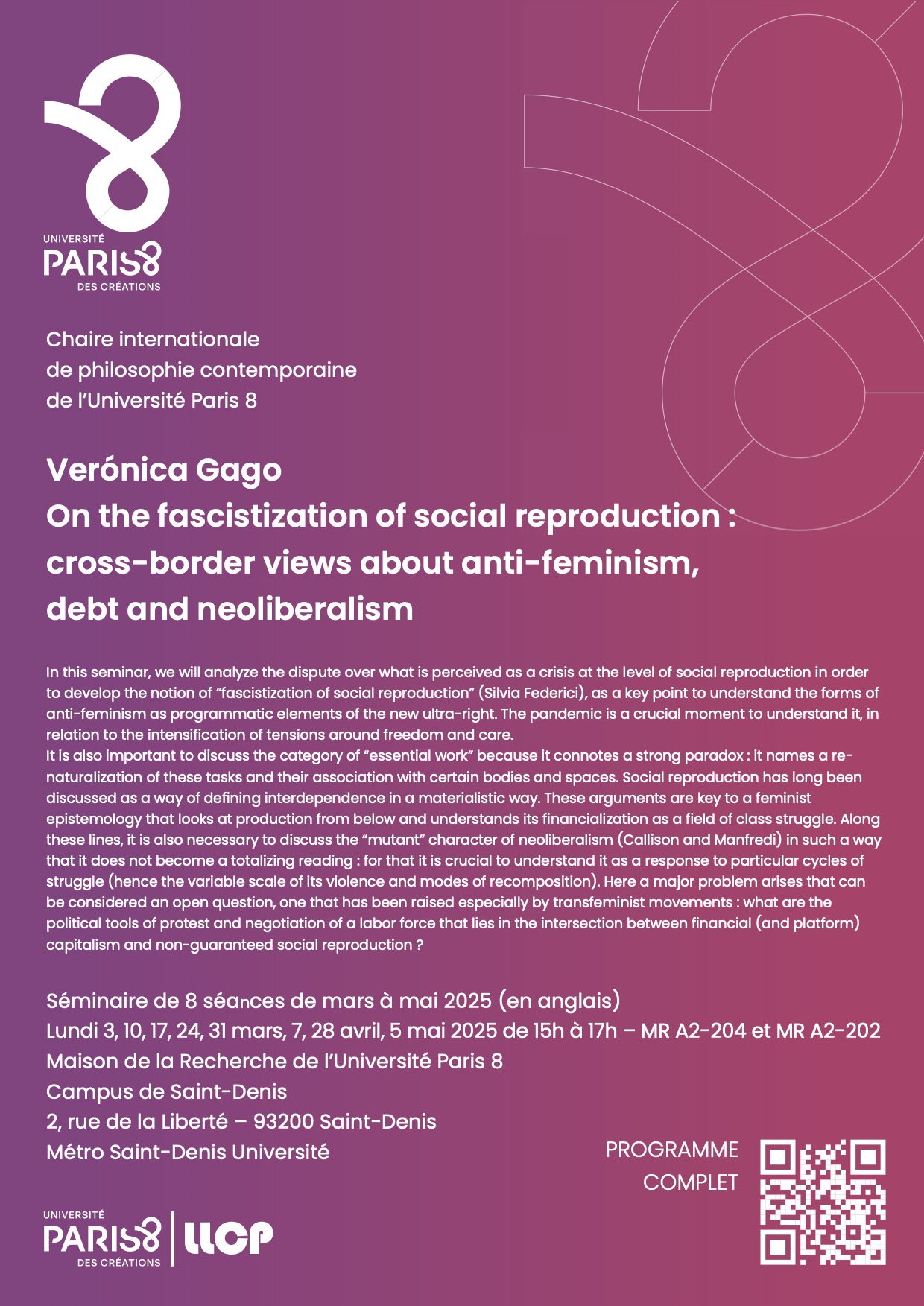Chaire internationale de philosophie contemporaine de l’Université Paris 8. Séminaire. Verónica Gago (UBA/UNSAM/CONICET). On the fascistization of social reproduction : cross-border views about anti-feminism, debt and neoliberalism. 2ème semestre 2024-2025
Chaire internationale de philosophie contemporaine de l’Université Paris 8
Séminaire 2024-2025
Verónica GAGO
(UBA/UNSAM/CONICET)
On the fascistization of social reproduction :
cross-border views about anti-feminism, debt and neoliberalism
Séminaire de 8 séances de mars à mai 2025 (en anglais)
Maison de la Recherche de l’Université Paris 8 | Campus de Saint-Denis
2, rue de la Liberté – 93200 Saint-Denis. Métro Saint-Denis Université
Calendar :
1. Monday, 3 March 2025, 3pm-5pm, room MR A2-204
2. Monday, 10 March 2025, 3pm-5pm, room MR A2-204
3. Monday, 17 March 2025, 3pm-5pm, room MR A2-204
4. Monday, 24 March 2025, 3pm-5pm, room MR A2-202
5. Monday, 31 March 2025, 3pm-5pm, room MR A2-202
6. Monday, 7 April 2025, 3pm-5pm, room MR A2-202
7. Monday, 28 April 2025, 3pm-5pm, room MR A2-202
8. Monday, 5 May 2025, 3pm-5pm, room MR A2-202
Zoom : https://univ-paris8.zoom.us/j/94837170296?pwd=2ATm8yimB0JBSIqG3lUFZyK3JBZm4M.1
In this seminar, we will analyze the dispute over what is perceived as a crisis at the level of social reproduction in order to develop the notion of “fascistization of social reproduction” (Silvia Federici), as a key point to understand the forms of anti-feminism as programmatic elements of the new ultra-right. The pandemic is a crucial moment to understand it, in relation to the intensification of tensions around freedom and care.
It is also important to discuss the category of “essential work” because it connotes a strong paradox : it names a re-naturalization of these tasks and their association with certain bodies and spaces. Social reproduction has long been discussed as a way of defining interdependence in a materialistic way. These arguments are key to a feminist epistemology that looks at production from below and understands its financialization as a field of class struggle. Along these lines, it is also necessary to discuss the “mutant” character of neoliberalism (Callison and Manfredi) in such a way that it does not become a totalizing reading : for that it is crucial to understand it as a response to particular cycles of struggle (hence the variable scale of its violence and modes of recomposition). Here a major problem arises that can be considered an open question, one that has been raised especially by transfeminist movements : what are the political tools of protest and negotiation of a labor force that lies in the intersection between financial (and platform) capitalism and non-guaranteed social reproduction ?
The seminar is open to undergraduate, graduate and doctoral students and to free auditors.
Information alongside Ariane Revel : ariane.revel@gmail.com.
Registration within the cursus with Driss Bellahcene : Building A, Office A029 | driss.bellahcene@univ-paris8.fr.
Calendrier :
1. Lundi 3 mars 2025, 15h-17h, MR A2-204
2. Lundi 10 mars 2025, 15h-17h, MR A2-204
3. Lundi 17 mars 2025, 15h-17h, MR A2-204
4. Lundi 24 mars 2025, 15h-17h, MR A2-202
5. Lundi 31 mars 2025, 15h-17h, MR A2-202
6. Lundi 7 avril 2025, 15h-17h, MR A2-202
7. Lundi 28 avril 2025, 15h17h, MR A2-202
8. Lundi 5 mai 2025, 15h-17h, MR A2-202
Zoom : https://univ-paris8.zoom.us/j/94837170296?pwd=2ATm8yimB0JBSIqG3lUFZyK3JBZm4M.1
Dans ce séminaire, nous analyserons le débat sur ce qui est perçu comme crise de la reproduction sociale : ce sera le moyen de développer la notion de « fascisation de la reproduction sociale » (Silvia Federici), qui constitue un point clé pour comprendre les formes de l’antiféminisme comme éléments programmatiques de la nouvelle ultra-droite. La pandémie est un moment décisif pour cette compréhension, en lien avec l’intensification des tensions autour de la liberté et des soins.
La catégorie de « travail essentiel » doit également constituer un point important de la discussion. Elle est en effet porteuse d’un fort paradoxe : elle effectue une re-naturalisation de ces tâches et les associe avec certains corps et espaces. La reproduction sociale a depuis longtemps été l’objet de débats en tant qu’elle est permet de définir l’interdépendance d’un point de vue matérialiste. Ces arguments sont la clé d’une épistémologie féministe qui prend en compte la production par le bas et comprend sa financiarisation comme un terrain de la lutte des classes. Dans le même ordre d’idées, il est également nécessaire de discuter du caractère « mutant » du néolibéralisme (Callison et Manfredi) pour éviter une lecture totalisante de ce dernier : il est pour cela crucial de le comprendre comme une réponse à des cycles de lutte particuliers (ce qui permet de rendre compte des variations d’échelle de sa violence et de ses modes de recomposition). Un problème majeur se pose ici, qui peut être considéré comme une question ouverte, soulevée en particulier par les mouvements transféministes : quels sont les outils politiques de protestation et de négociation d’une force de travail qui se trouve à l’intersection entre la finance (et les plates-formes) et l’économie (et la société) ?
Le séminaire est ouvert aux étudiant·e·s de licence, master et doctorat, et aux auditeur·trice·s libres.
Renseignements auprès de Ariane Revel : ariane.revel@gmail.com.
Inscriptions dans le cadre des cursus auprès de Driss Bellahcene : Bâtiment A, Bureau A029 | driss.bellahcene@univ-paris8.fr.





